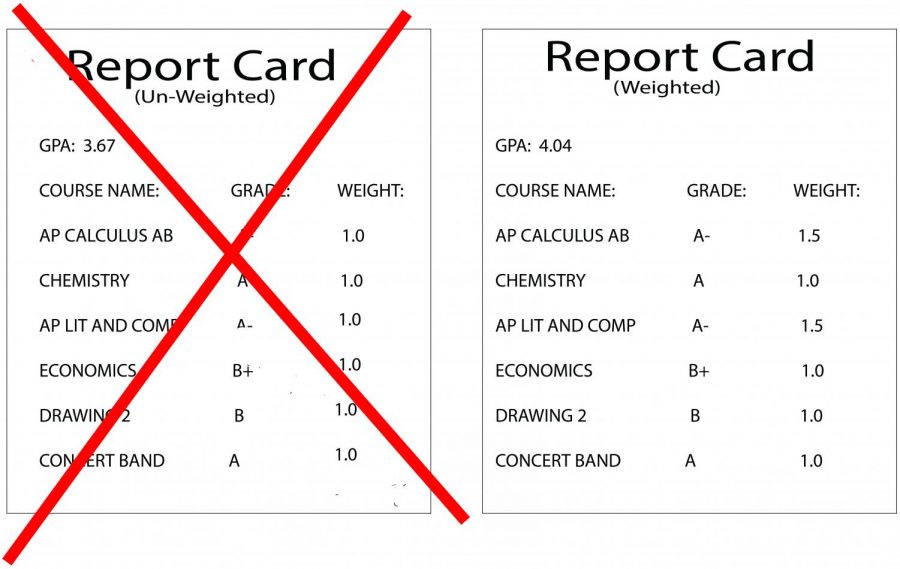Weighted grades would encourage students to seek greater challenge
When comparing the grades received in the same courses under both a weighted grading system and an unweighted grading system, the positive effect on one’s GPA using the weighted system is extremely obvious. “I believe that weighted grading more accurately represents a student’s performance because it takes into account the difficulty of classes,” said senior Miguel Brandao.
November 30, 2018
In high school there is a tremendous emphasis on grading and grades, including focus on the grade value of assignments, and evaluation of knowledge and skills through testing and summative projects. Currently, at South, equivalent grades for all courses are weighted equally in the calculation of a student’s GPA (out of 4.0). However many schools use a system of “weighting” or giving higher value to grades earned in more rigorous classes in the calculation of GPA. Because it rewards students for seeking greater academic challenges, the system of weighted grades for rigorous classes is most advantageous to students.
On September 4th 2018, under Policy 5395, Minneapolis Public Schools repealed their policy related to weighted grades for higher level classes, now stating that “Minneapolis Public Schools does not employ a weighted grade practice for any courses in which a student may enroll.”
Prior to this, several Minneapolis Public Schools [excluding South] employed a system of weighted grading.
In a study conducted by Gail C. Downs in 2000, it was found that more than half of the nation’s high schools grade in this way. Schools utilize weighted grading as a way to give a numerical advantage- in class rank- to those who take on the challenge of upper-level classes. Under this system, rigorous classes like AP classes are given a higher weight towards one’s GPA than regular-level classes.
According to The Glossary Of Education Reform, “The fundamental rationale for weighting grades is it incentivizes students to challenge themselves academically. By assigning greater value to grades earned in more challenging courses, weighted grades remove a potential disincentive to take tougher courses — worrying that a lower grade might adversely affect their GPA or class rank.”
“I think that some students that are worried about their GPAs might take higher level classes if class rank were based on weighted GPA [for the incentive],” said South chemistry teacher Mike Berseth.
Concurring with that statement, senior Miguel Brandao commented, “I think that [weighted grading] would make students take more challenging classes and play almost less safe. ‘Easy A’s’ would not be as desirable.”
Weighted grading also lessens the pressure on students to achieve the highest grades in extremely tough classes; rather it helps students focus on hard work and striving to understand the concepts of the course.
“I think weighted grading is more important than the standard grading policy… if it’s a more advanced class your grade should mean more because you’re learning at an accelerated rate,” said junior Adriana Carreño.
“I believe that weighted grading more accurately represents a student’s performance because it takes into account the difficulty of classes,” said Brandao.
Many high-achieving students are generally very concerned about their GPA. “I do feel like there’s a pressure to make sure that students who have very high GPAs keep them,” added Berseth. “I think they’re very adamant about keeping those very high GPAs.”
“Because of general grade inflation, weighting also helps high-performing students stand out from the pack,” said the Educational Research Newsletter.
This is true, seeing as students who want to take AP classes generally end up doing particularly well. “There are a lot of options for advanced classes at South,” said Carreño. “They shouldn’t be graded the same as regular classes because not only are you learning more advanced subjects but you were also open to harder work and maybe even more stressful environments, which should give you a grading advantage.”
Weighted grading systems allow for more numerically complex class rankings, and thus students are more easily distinguished from one another. “This grading could separate students so that we don’t have 15 kids ranked number one in their class,” said Brandao. “That shouldn’t be possible.”
Additionally, weighted grading is known to increase participation in AP courses, since more students take higher level classes. This pressures the school to make their academic programs even stronger and often results in bettering the school’s reputation.
Weighted grading has been shown to increase a student’s GPA, improving their competitive edge for college applications and boosting student self-esteem. It would help to promote a critical-based thinking learning experience rather than one of facts and memorization.
Overall, weighted grading is a system with many advantages, but in particular it encourages students to embrace greater academic challenges.






